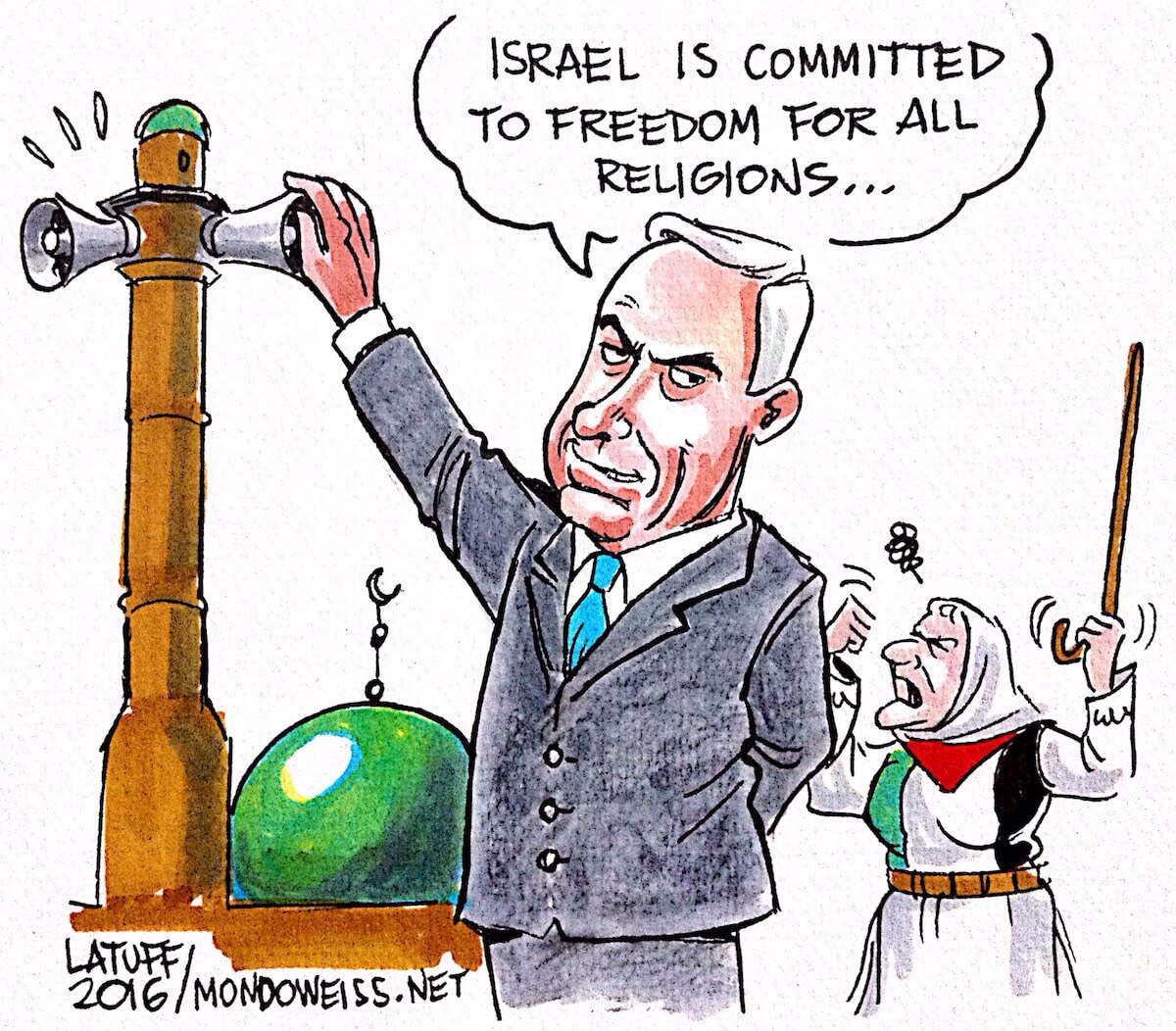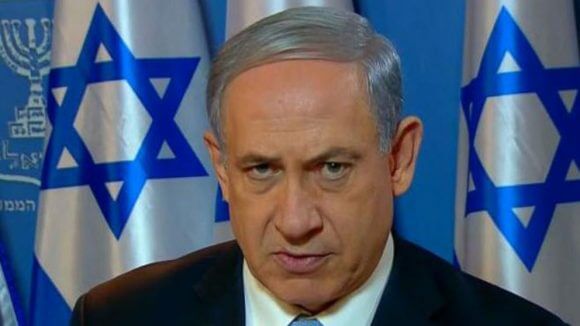The Israeli government this week continued to stall a so-called “muezzin bill” that if passed would criminalize mosques for playing the call the prayer over loudspeakers, legislation that critics deem a political move by the Israeli Prime Minister to appease the far-right.
A preliminary Knesset vote on the bill was postponed for the fourth week in a row Wednesday after ongoing rejection from across the political spectrum.
MK Moti Yogev of the far-right Habayit Hayehudi party proposed the bill and stated last week its aim was to “prevent noise from houses of worship was designed to safeguard the sleep of citizens, Jews and Muslims alike.”
An anti-noise law already exists that can and has been used to address loudspeakers playing the call to prayer above state-allotted decibel levels. Reut Mor, spokeswoman for Joint List head MK Ayman Odeh, said the bill was formed with the sole intention to silence mosques, calling the bill “racist” and a “dead letter.”
While Yogev’s initial version applied only to mosques, a revised bill including all houses of worship was later okayed by Israeli ministers for Knesset review, spurring Israel’s Minister of Health, ultra-Orthodox Yaakov Litzman, to appeal the bill out of fear of its potential impact on use of the Shabbat siren.
Litzman unblocked the bill after revisions allowed a loophole for the siren, according to Israeli media.
Likud MK Yehudah Glick and Zionist Union MK Zouheir Bahloul later launched so-called interfaith talks aimed to solve noise complaints without legislative measures, shortly after Israeli President Reuven Rivlin hosted Jewish, Muslim and Christian leaders who also discussed how the issue could be resolved through dialogue rather than law.
Police meanwhile reportedly opposed the bill on the grounds that mediation was successful in past noise scuffles, nulling the need for legislation that would be difficult to enforce. Police incursions often turn violent in East Jerusalem villages in particular, where Palestinian residents already face regular raids.
Despite clear general consensus that legislation is the least effective way to address noise complaints against mosque loudspeakers, the Joint List’s Mor said Netanyahu continues to support the bill and has refused new proposals that would limit the bill to nighttime hours.
“He wants to have it 24 hours a day, which would stop completely the call to prayer from mosques,” Mor said.
Mor praised cooperation of several political parties working against the bill, but noted that coalition groups are under significant pressure from PM Benjamin Netanyahu, who has harnessed the most rightwing government in Israel’s history.
“With this Knesset, everything is possible, and if Netanyahu personally supports this law to pass, there is a chance it will pass,” Mor said.

Mor stands among many critics to say Netanyahu’s support for the bill is an effort to counterbalance internal political pressure he faces over the future dismantling of the illegal outpost of Amona, a decision that continues to spur mass controversy with many in the far-right settler bloc.
“This law is not about noise, it’s not about quality of life, Netanyahu doesn’t care about these issues. The bill is about inciting against the Arab population in a time that Netanyahu doesn’t look “right” enough for his right-wing settler base because of everything going on with Amona,” Mor said.
Attempts to evacuate the illegal outpost built on private Palestinian land have threatened to tear apart Netanyahu’s coalition, as the increasing political power of the far-right settlement bloc challenges the PM’s dedication to the over 100 illegal outposts currently standing.
Thabet Abu Ras, co-director of Israeli rights group the Abraham Fund, also pointed to fears that the current government could potentially pass the legislation due to such pressures.
“There is a new atmosphere in Israel, a racist atmosphere because of the last elections. The Israeli government is a radical one that thinks that it can do whatever it wants,” Abu Ras told Mondoweiss.
“They are targeting the Arab community and trying to limit their political and religious space in Israel,” Abu Ras said.
While the bill has oft been framed by critics as a threat to freedom of religion, Nur Arafeh of Al-Shabaka for her part cautioned against focusing on the bill solely an issue of religious freedom.
“Attempts by the Israeli rightwing to push legislation to ban call to prayers is only another colonial move to eradicate any reminder of Palestinian/ non-Jewish presence in Israel and occupied East Jerusalem,” Arefeh told Mondoweiss.
“Framing the issue as a religious one not only ignores the reality of power imbalance between the colonizer and the colonized, but it also fails to take into account the historical and current context of increasing Israeli efforts to erase Palestinian identity and culture and expand Jewish sovereignty over occupied East Jerusalem and Palestinian citizens of Israel,” Arafeh said.
Talk of the discriminatory bill has already incited outcry among Palestinians, particularly in East Jerusalem where it would apply to some 300,000 Palestinians who live in the Israeli-occupied area and are subject to Israeli law.
Israeli government policy since the illegal takeover of the eastern part of the city in 1967 has aimed for the “Judaization” of Jerusalem, assisting settlement groups to expand across Palestinian areas of the city in order to gain a Jewish majority and erase Palestinians from public space.
Abu Ras, who has long worked for equality, said this was the first time a bill attempting to legislate solely against mosque loudspeakers had made it this far towards becoming a law and slammed the government for discriminatory legislation.
“There is a law in Israel against general noise. I’m in favor of implementation of this law on all communities in Israel…but to try to act a specific law against Muslims, we cannot tolerate that,” Abu Ras told Mondoweiss
Israel’s legal system sets rich precedent for laws targeting Palestinians, with rights group Adalah citing at least 50 laws currently in place that directly limit Palestinian rights.
Palestinians in the occupied West Bank have also spoken out against the bill, seeing it as an echo of restrictions they already feel under Israeli military occupation. Prominent activist Issa Amro told Mondoweiss that locals in the Hebron area “are talking about it [the bill] a lot.”
“Absolutely it will be another cause of cycle of violence if it [the bill] passes,” Amro told Mondoweiss.
“When they [Israeli military] restrict the call to prayer during Jewish holidays here [Hebron], people feel frustrated…they feel their freedom of religion is violated,” Amro said.
Abu Ras for his part has aligned with the dialogue camp to address any existing tensions over noise.
“There may be problems with loudspeakers, but these kinds of problems can only be solved locally, through local dialogue,” he told Mondoweiss, citing successful efforts in the past in Jaffa.
“We are looking for integration, we are looking for inclusive messages from the Israeli leadership rather than incitement,” Abu Ras added.



i guess it is “racist” because like jews are not a specific race, muslims are a ‘race’. and only the western leftist msm and other israel-hating arab/muslim hasbarists are crying and making hay about this law. if mw was honest enough to survey the typical israeli arab about turning off the loudspeaker systems between early a.m and morning they would find the israeli arabs are almost as enthusiastic about it as the christians and jews.
now-if they would just pass a law to shut up the loud-mouthed garbagemen.